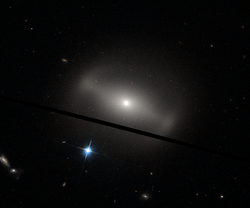NGC 1460
NGC 1460 is a barred lenticular galaxy in the constellation Eridanus. It was discovered by John Herschel on November 28, 1837.[2] It is moving away from the Milky Way 1341 km/s.
| NGC 1460 | |
|---|---|
 Hubble Space Telescope image of NGC 1460 | |
| Observation data (J2000 epoch) | |
| Constellation | Eridanus |
| Right ascension | 03h 46.13m[1] |
| Declination | −36° 41′[1] |
| Redshift | 1341 ± 12 |
| Distance | 19.25 megaparsecs (62.8 Mly) |
| Apparent magnitude (V) | 12.6[1] |
| Characteristics | |
| Type | SB0[1] |
| Apparent size (V) | 1.4′ × 1.0′[1] |
| Notable features | Barred lenticular galaxy, with huge bar |
| Other designations | |
| PGC 13805, ESO 358-62, MCG -6-9-31 | |
Distance and size
At a distance of nearly 63 million light-years, it is a member of Fornax Cluster. Its size on night sky is 1.4' x 1.0' which is proportional to its real size of 30,000 light-years, which makes it one of the smaller galaxies in Fornax Cluster.
Characteristics
NGC 1460 has a Hubble classification of SB0, which indicates it is a barred lenticular galaxy. But, this one contains a huge bar at its core. The bar is spreading from center to the edge of the galaxy, as seen on Hubble image in the box. This bar is one of the largest seen in barred lenticular galaxies.
NGC 1460 is also an early-type galaxy. Despite their name, early-type galaxies are much older than spiral galaxies, and mostly comprise old, red-colored stars. Very little star formation occurs in these galaxies; the lack of star formation in elliptical galaxies appears to start at the center and then slowly propagates outward.[3] This galaxy is early-type lenticular, but lenticular galaxies have as same process as elliptical galaxies.
References
- Dunlop, Storm (2005). Atlas of the Night Sky. Collins. ISBN 978-0-00-717223-8.
- Steinicke, Wolfgang (August 19, 2010). Observing and Cataloguing Nebulae and Star Clusters: From Herschel to Dreyer's New General Catalogue. Cambridge University Press. p. 82. ISBN 9781139490108.
- Howell, Elizabeth (2015). "Colossal Ancient Galaxies Die from the Inside Out". space.com. Retrieved March 5, 2017.